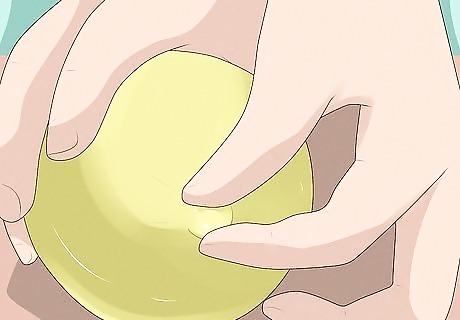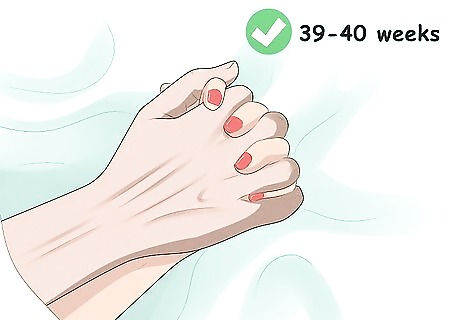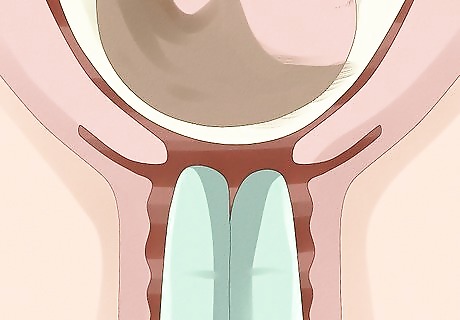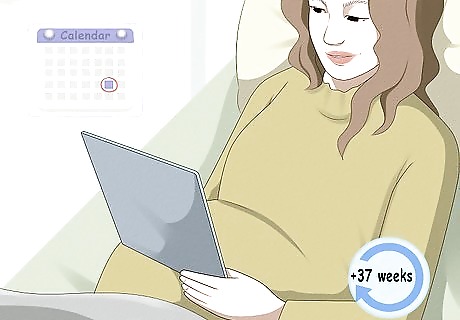
views
Methods That Might Work

Walk for 30 minutes a day leading up to your due date. Light physical activity is a common remedy to induce labor. There isn’t much scientific evidence that it works, but a 30-minute walk each day leading up to your due date might help. Even if it doesn’t trigger labor, it could make the birthing process easier on you. Exercise can also help build your endurance, which can make labor easier to get through. Staying active during your pregnancy is overall good for your and your baby’s health. Talk to your doctor about the right exercise routine for you.

Stimulate your nipples to release oxytocin. This method is one of the few natural remedies that seems to work. Oxytocin is a hormone that could induce labor, and nipple stimulation releases oxytocin. Try lightly pinching your areolas between your thumbs and index fingers and rolling them for 10 minutes. You may have to repeat this for a few days in a row to see any result. Your partner can help stimulate your nipples as well. There are also pumps or patches that you can use to stimulate your nipples. Ask your doctor about using one of these devices.

Have sex to stimulate contractions. Sex also releases oxytocin, which could induce contractions and labor. Research is mixed, but this method could work for you. Try having sex towards the end of your pregnancy to see if it helps. A man's sperm contains prostaglandin, which can cause the uterus to contract. This, in turn, can stimulate labor. Ask your doctor if sex late in your pregnancy is safe. If you have any complications, your doctor will probably tell you not to have sex. Don’t have sex if your water has already broken because there’s a higher risk for catching an infection.

Try eating dates for 4 weeks before your due date. One study showed that women who ate dates during their last month of pregnancy were less likely to require medically-induced labor. It also showed higher cervical dilation in the women who ate dates compared to those who didn’t. Try eating dates in the last month of your pregnancy to see if this works for you. One midwife recommends eating 6 dates a day leading up to your due date. Get whole dates instead of chopped ones, which are usually high in added sugar.

Let your doctor try membrane stripping if you've started dilating. Membrane stripping is a procedure where the doctor or midwife uses their finger to separate the baby's amniotic sac from your cervix. This could release hormones and trigger labor. It has mixed results, but this could be a way to speed the labor process along if you've already started dilating. Don't try to perform membrane stripping by yourself. It's possible to injure yourself or cause an infection if you don't do it correctly.

Avoid using any herbal remedies to induce labor. There are many other herbal remedies that proponents claim can induce labor. However, while some herbal treatments could induce labor, there isn’t enough evidence to conclude that these remedies are safe for you or your baby. Avoid them until more research is done. Some of the most common herbal remedies include blue or black cohosh, raspberry leaf, and evening primrose. None of these are safe to use if you're pregnant. Spicy foods and pineapple are also popular home remedies to induce labor. These don't work either, but they aren't harmful as long as they don't upset your stomach.
Steps to Take Before Inducing

Discuss inducing labor with your doctor or midwife before trying it. Inducing labor yourself could lead to complications or risks for you or your baby. If you’re considering inducing yourself, discuss it with your doctor or midwife first so you understand all the methods and risks. Don’t be surprised if your doctor counsels you against inducing labor yourself, since most of the methods aren’t proven to work.

Wait until you’re at least 37 weeks pregnant to try inducing. If you try to induce yourself before that, your baby could be born premature. Only start considering natural methods when your baby reaches full term.

Confirm that you or your baby don’t have any complications. Inducing labor yourself is only safe as long as you’ve had a healthy pregnancy and don’t have any complications. If you or your baby show any complications, then inducing labor yourself is dangerous. If your baby is breech, meaning their feet are facing down, then don’t induce labor yourself. Also if you’ve had a previous C-section or any issues with your placenta, then inducing labor yourself isn’t safe.

Don’t try to induce labor if your doctor tells you not to. There are a number of reasons that your doctor would counsel you against inducing labor yourself. If you speak with your doctor and they say trying to induce yourself is dangerous, then listen and don’t try it. This is the safest option for your and your baby. Some reasons your doctor might forgo inducing labor include if you have low blood pressure, a compromised immune system that leaves you more susceptible to infections, or a bleeding disorder that could cause you to bleed too much during labor.




















Comments
0 comment